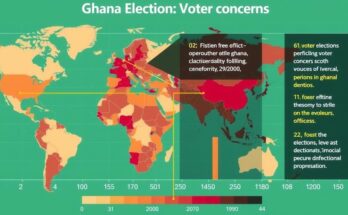A report by Open for Business reveals that Uganda’s Anti-Homosexuality Act may have cost the country up to $1.6 billion in lost GDP and could lead to losses ranging from $2.3 to $8.3 billion over the next five years if not repealed. Key areas affected include tourism, foreign investment, and public health, prompting widespread international condemnation and financial repercussions from entities like the World Bank.
A comprehensive new report reveals that Uganda’s Anti-Homosexuality Act has significantly impacted the country’s economy, potentially costing up to $1.6 billion since its enactment. Conducted by Open for Business—a coalition advocating for LGBTQ+ inclusion—the report estimates that the financial losses represent between 0.9% to 3.2% of Uganda’s gross domestic product (GDP). In addition to the immediate loss of $470 million, analysts predict that the economic repercussions could accumulate to between $2.3 billion and $8.3 billion over the next five years if the law remains in effect. The report delineates several sectors adversely affected by the legislation, encompassing international aid, foreign investment, tourism, public health, and national reputation. Tourism is projected to suffer a potential loss ranging from $9 million to $99 million due to a decline in Uganda’s standing among Western nations. Furthermore, an estimated economic drain of $23 million to $58 million is attributed to the adverse effects on LGBTQ+ workers’ mental well-being, absenteeism, and reduced productivity. The report also underscores a potential “talent flight,” predicting a loss of $3 million to $24 million in productivity as approximately 5,000 to 15,000 LGBTQ+ individuals may leave Uganda to escape persecution. The report states, “the evidence is now clear. The Anti-Homosexuality Act makes it harder for Uganda to foster a dynamic and diversified modern economy that is attractive to investors, tourists and skilled workers.” Health implications include a forecasted financial burden of $70 million to $312 million due to the law’s restrictions on clinics specializing in LGBTQ+ healthcare and HIV prevention, which are likely to result in increased rates of untreated HIV infections. Enacted by President Yoweri Museveni in May 2023, the legislation imposes severe penalties for same-sex relations and closely associated activities, including life sentences and, in extreme cases, the death penalty for “aggravated homosexuality.” Following the law’s enactment, the Ugandan Constitutional Court upheld most of its provisions, despite invalidating some aspects deemed unconstitutional. Human rights advocates and Western leaders, including U.S. President Joe Biden and Pope Francis, have condemned the law. The United States reacted by removing Uganda from the African Growth and Opportunity Act, a decision expected to incur a loss of $500,000 in future tariff payments. Additionally, the World Bank has suspended new loan grants to Uganda, potentially costing the country between $276 million and $1 billion annually in lost foreign aid. In summary, the enactment and maintenance of Uganda’s Anti-Homosexuality Act have led to significant economic challenges, international isolation, and public health concerns, raising urgent questions about the country’s future prospects and the well-being of its citizens.
The Anti-Homosexuality Act in Uganda has been a source of global controversy since its inception in May 2023. It has drawn widespread condemnation from human rights organizations and various international leaders. The law imposes harsh penalties, including life imprisonment and the death penalty, for individuals involved in same-sex relationships. Following the law’s passage, notable actions were taken by international entities, such as the suspension of Uganda’s eligibility for the African Growth and Opportunity Act and financial repercussions from the World Bank. The report by Open for Business provides insight into how this law threatens Uganda’s economic stability and health outcomes, highlighting the broader implications for social inclusion and human rights.
In conclusion, the Anti-Homosexuality Act has not only created a dire humanitarian situation within Uganda but has also precipitated substantial economic repercussions. The report by Open for Business emphasizes the urgency for repeal to avert further losses and to foster a more inclusive and prosperous society that can attract global investments, safeguard public health, and uphold human rights. Addressing these issues is critical for the future well-being of both the Ugandan populace and its economy.
Original Source: www.metroweekly.com




